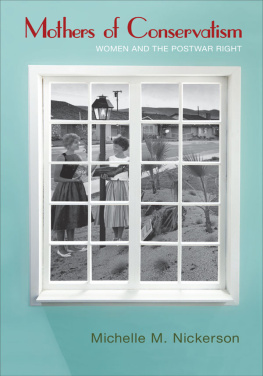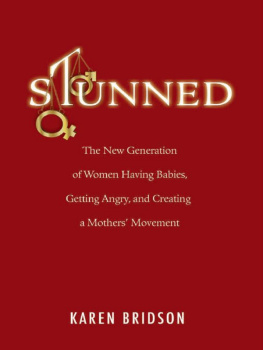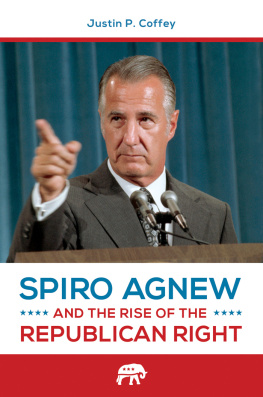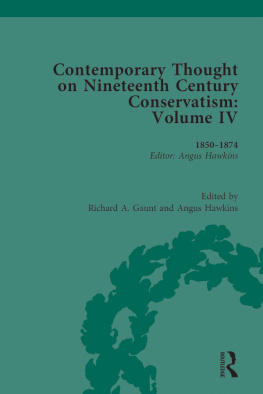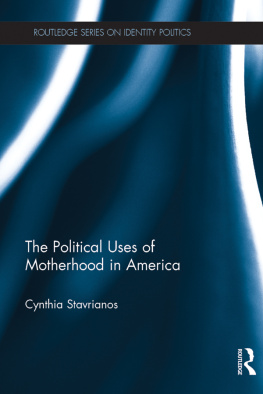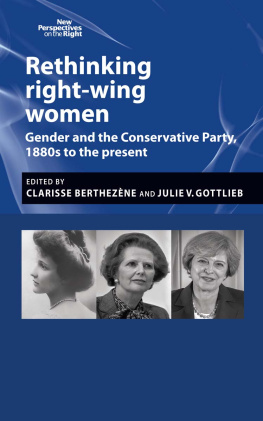Mothers of Conservatism
POLITICS AND SOCIETY IN TWENTIETH-CENTURY AMERICA
SERIES EDITORS
William Chafe, Gary Gerstle, Linda Gordon, and Julian Zelizer
A list of titles in this series appears at the back of the book
Mothers of Conservatism
WOMEN AND THE POSTWAR RIGHT
Michelle M. Nickerson
P R I N C E T O N U N I V E R S I T Y P R E S S
P R I N C E T O N A N D O X F O R D
Copyright 2012 by Princeton University Press
Published by Princeton University Press, 41 William Street, Princeton, New Jersey 08540
In the United Kingdom: Princeton University Press, 6 Oxford Street, Woodstock, Oxfordshire OX20 1TW
press.princeton.edu
All Rights Reserved
LIBRARY OF CONGRESS CATALOGING-IN-PUBLICATION DATA
Nickerson, Michelle M.
Mothers of conservatism : women and the postwar right / Michelle M. Nickerson.
p. cm. (Politics and society in twentieth-century America)
Includes bibliographical references and index.
ISBN 978-0-691-12184-0 (hardback : acid-free paper) 1. WomenPolitical activityUnited StatesHistory20th century. 2. ConservatismUnited StatesHistory20th century. 3. United StatesPolitics and government20th century. 4. FeminismUnited StatesHistory. I. Title.
HQ1236.5.U6N53 2012
320.082dc23 2011021793
British Library Cataloging-in-Publication Data is available
This book has been composed in ITC Berkeley Oldstyle Std
Printed on acid-free paper.
Printed in the United States of America
10 9 8 7 6 5 4 3 2 1
For Ben and Tobias
Contents
| Map of Los Angeles County, 1963 |
| The First Congregational Church of Los Angeles, ca. 1935 |
| Woodland Hills, San Fernando Valley, California, 1959 |
| Valley Hunt Club, Pasadena, California, 1941 |
| Marie Koenig and James Ingebretsen at Spiritual Mobilization, ca. 195056 |
| Florence (Niehls) Ranuzzi, Showgirl |
| Marion Miller, Housewife Spy |
| Mary Allen, 1956 |
| Houston Chapter, Minute Women of the U.S.A., 1953 |
| Florence Fowler Lyons, 1952 |
| American Public Relations Forum, Speakers Kit on Mental Health, ca. 1962 |
| Siberia U.S.A Cartoon, National Review, 1956 |
| Poor Richards Book Shop, ca. 196163 |
| South Pasadena Americanism Center, ca. 1964 |
| Map of Conservative Bookstores, 1960s |
| Janet Greene, Anticommunist Folk Singer, ca. 1966 |
| Goldwater Girls, 1964 |
I WOULD NEVER have completed this book without the support of numerous friends, colleagues, and institutions who saw this project through to the very end. Clara Platter, Brigitta van Rheinberg, Sara Wolf, and Karen Carter at Princeton University Press have worked patiently with me to bring this manuscript to print. The Graduate School, American Studies Program, and Center for the Study of Frontiers and Borders at Yale University provided the initial dissertation fellowships that launched the project, and the University of Texas at Dallas, the Historical Society of Southern California, the Haynes Foundation, and the Autry Center for Western History also funded this work. The History Department and Fondren Library at Southern Methodist University furnished me with the borrowing privileges and comfortable study carrel that enabled me to execute the initial revision stages during a year of unemployment in Dallas. I would especially like to thank the Huntington Library in San Marino, California, for the generous fellowships and for the supportive community of scholars and staff in residence that have sustained me all these years.
I have benefited enormously from the expertise of generous archivists, librarians, and collectors who helped me access amazing historical materials. Robert Marshall and the staff at Calstate Northridges Urban Archives Center dazzled me with the rich and deep collections they have amassed in Los Angeles organizational history. Bill Frank and Alan Jutzi, at the Huntington helped sustain this project with their unflagging assistance and enthusiasm. Bill Geerhart, mastermind behind the Cold War and atomic culture website www.conelrad.com has shared valuable resources from his media, document, and oral history collections over the years. The staff at the Arizona History Foundation, especially Susan Irwin, Rebekah Tabah, and Linda Whitaker, has been incredibly generous in helping me expand my research on the Goldwater campaign, as has David Roepke at the Ashland University Archives. I am indebted also to the Southern Methodist University Library system, especially to Russell Martin and Anne Peterson at the DeGolyer Library and Cindy Boeke in Digital Collections. Thank you, Roy Bullock in Pasadena, for sharing your personal collection of John Birch Society materials. Research would have been far more difficult if I had not been able to access the superb collection of electronic resources at UT Dallas through its fabulous staff, especially Linda Snow and the anonymous interlibrary loan staff who deliver documents at lightning speed. I would also like to thank the librarians and archivists who helped me at the Seaver Center for Western History Research at the Museum of Natural History in Los Angeles, the Special Collections archives at UCLA, librarian Kristine Kasianovich at UCLA, and the Special Collections and University archives at the University of Oregon.
Gracious colleagues, friends, and students have read and commented on drafts of this book. Nancy Cott, John Faragher, Robert Johnston, and Steven Pitti gave the first round of valuable criticism on the manuscript in the form of dissertation readers reports. My first manuscript writers groupSuzanne Bost, Deborah Cohen, and Alexis McCrossengave the next round of comments and much needed support in those early years. In my year on the Fletcher Jones Foundation Fellowship at the Huntington I acquired more precious readers, including Stephen Aron, Bill Deverell, Joe Hall, Cheryl Koos, Virginia Scharf, Robert Self, and participants in the Autry Centers Western History workshop. Thank you, David Farber, for letting me continue to adopt you as a political history mentor and for reading the introduction. Becky Nicolaides and Andrew Sandoval-Strausz, you helped me with great advice right at the end. Thank you Nancy Cott, for looking at anything I sent you and turning it over so quickly. I made the right move by assigning part of my manuscript to my graduate seminar, New Directions in U.S. Political History. Thank you so much, 7399, for your questions, comments, and ongoing support: Lilian Barger, Lisa Federer, Michael Harding, Kristin Hoppe, Megan Malone, Donald McLaughlin, Michael Noble, Kimberly Pettigrew, Martin Russell, Shirley Terrell, Kenneth Vaughn, and Kevin Walters. The Arts and Humanities Works-In-Progress group at UT Dallas gave me valuable edits on the first chapter; thank you, Sean Cotter, Meg Cotter-Lynch, and Natalie Ring. Thanks also to the historians who participated in the Johns Hopkins Seminar, which contributed invaluable criticism on this chapter as well. I am fortunate to live with one of the professions toughest editors, Benjamin Johnson, who brought his scrutiny to bear on as much of this project as my fragile ego could take. I am especially indebted to two readers for the work they put into this manuscript: my series editor at Princeton University Press, Linda Gordon, who scoured chapter drafts at various stages and gave pages of valuable comments, detailed line edits, and ample encouragement along the way; and my friend and collaborator Darren Dochuk, who read just about every chapter in various stages and cheered me on in the toughest moments of the revision process.
Crucial to this book have been a number of conservative and moderate Republican activists and family members who allowed me to interview them and in some instances also shared photos or opened their personal archival collections to me. I would especially like to thank Mary Cunningham and Gianna Ranuzzi, for granting me full access to the political materials of their late parents, Florence and F. X. (Frank) Ranuzzi after Florence endured a marathon two-day interview with me. Activist Jane Crosby, originally of South Pasadena, generously shared her personal papers, sat for an interview, and continues to answer my questions. After the late Marie Koenig generously opened her enormous private archive to me, her daughters, Margaret and Susan, gave it to the Huntington Library, where I and other scholars continue to mine it. I am especially grateful to Lucy Hilands of San Marino, who connected me to numerous activists in her friendship circles and has kept me connected to that community over many years. I have been so fortunate to have found these women.
Next page
